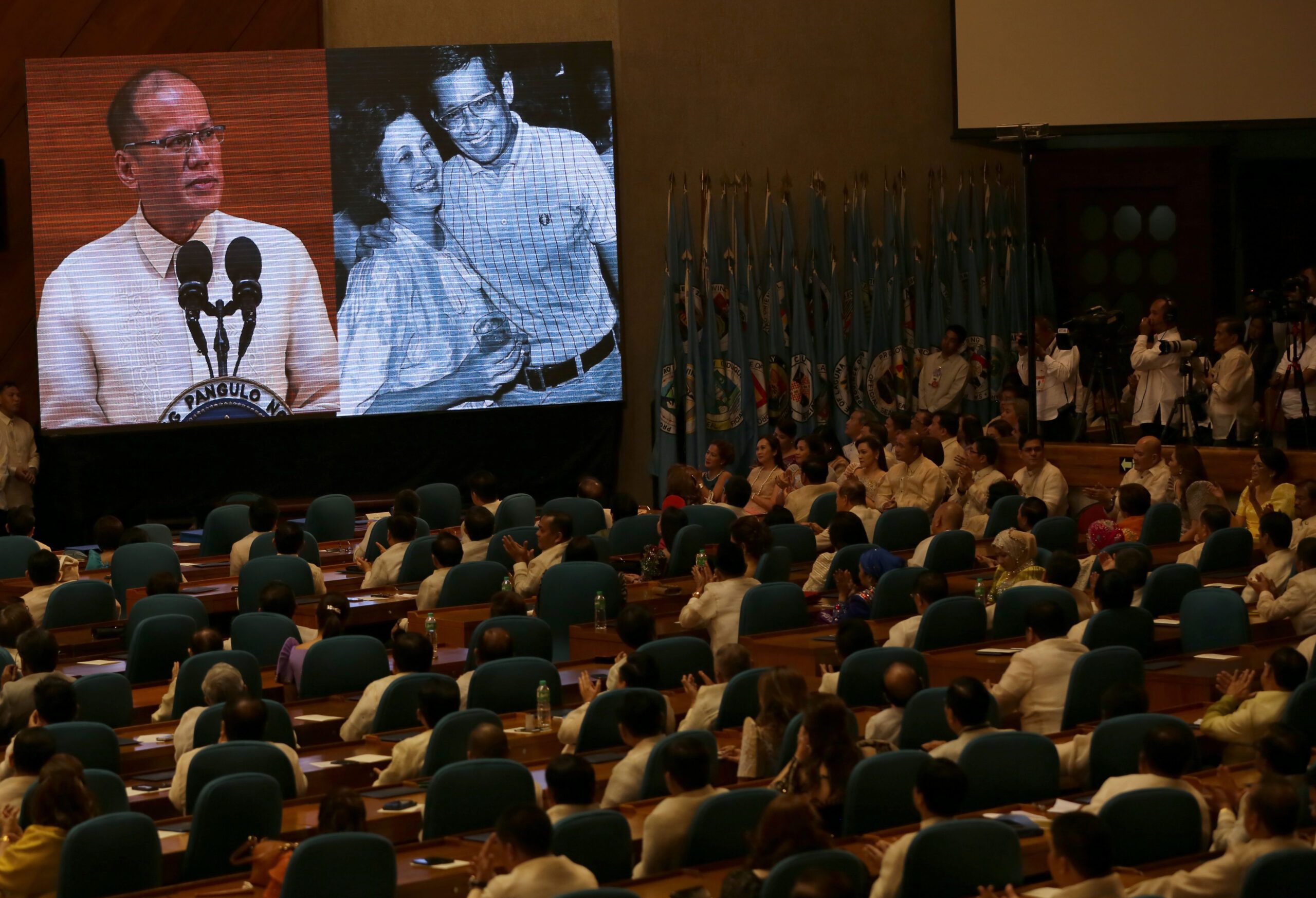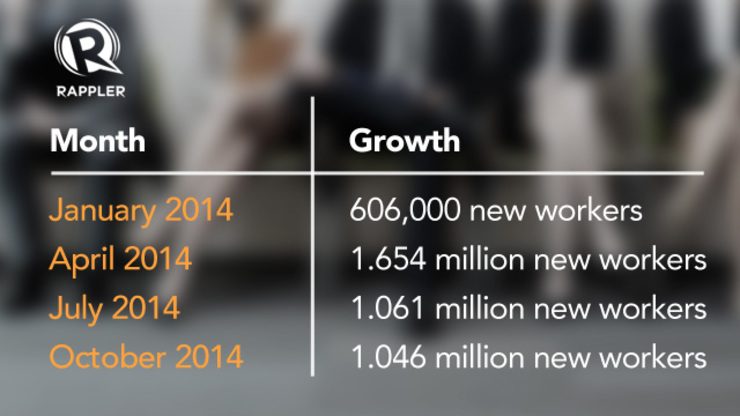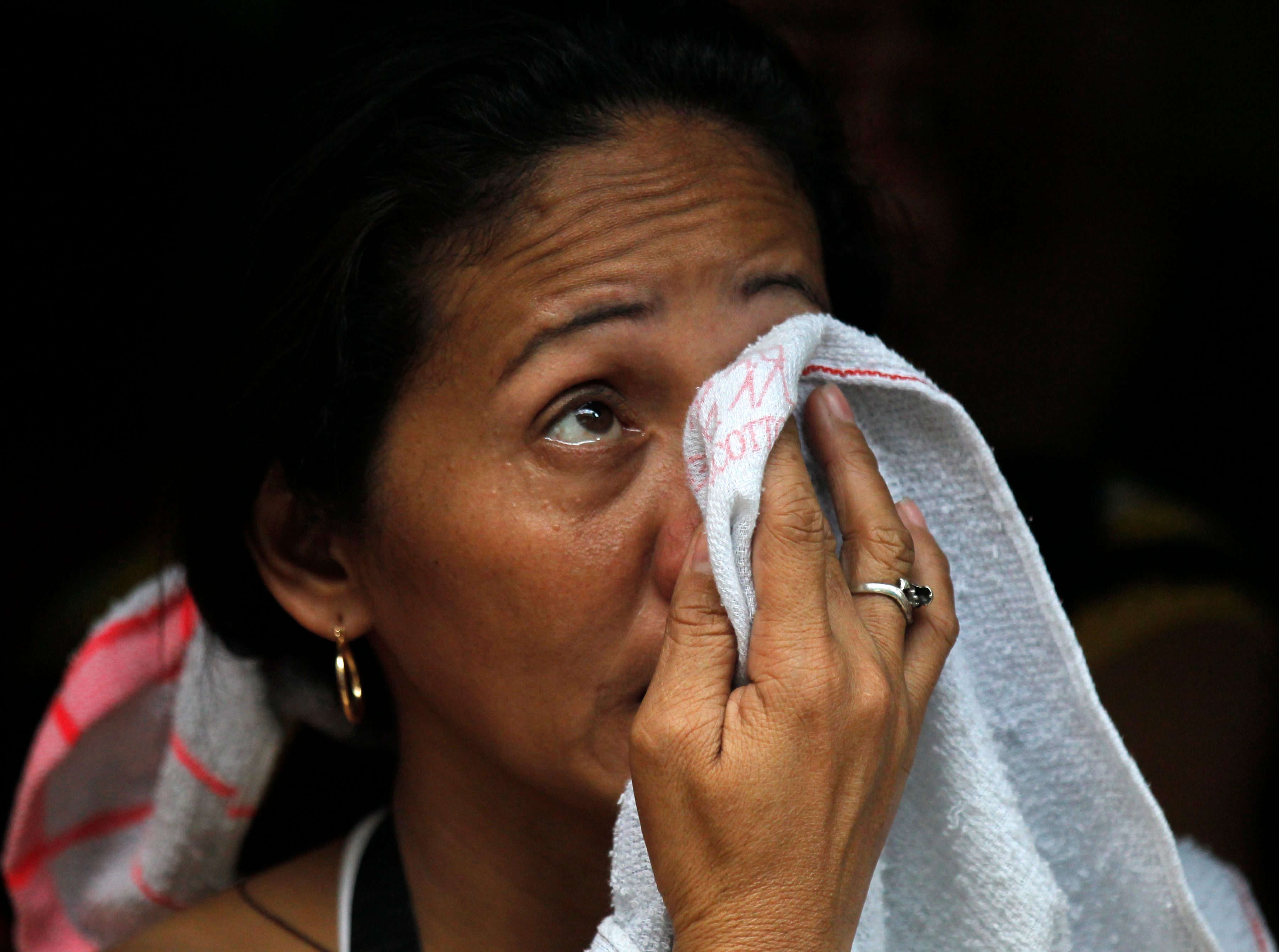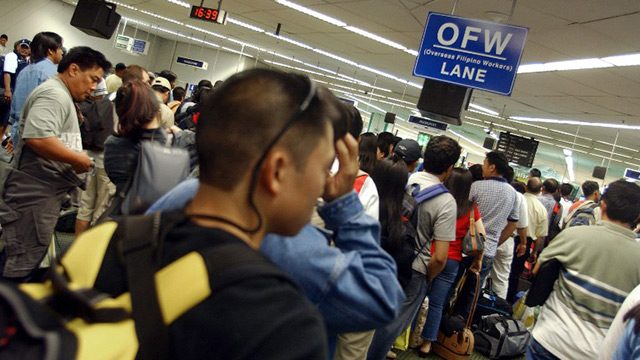SUMMARY
This is AI generated summarization, which may have errors. For context, always refer to the full article.

MANILA, Philippines – Unemployment rate was at its lowest in 10 years, and the manufacturing industry’s annual average growth rose to 8%.
President Benigno Aquino III boasted of these gains for the labor sector in his 6th and last State of the Nation Address (SONA) on Monday, July 27.
He said jobs creation was the primary measure that growth truly made an impact on the lives of ordinary Filipinos.
He cited the October 2014 Labor Force Survey (LFS) of the Philippine Statistics Authority (PSA), which reported that the country’s unemployment rate decreased to 6.8% – the lowest in a decade.
There were 1.046 million new workers in October 2014, with workers in the services sector driving the employment rate.

Labor Secretary Rosalinda Baldoz, the so-called “Pastora” of the Aquino Cabinet, received praise for her solutions-based approach to labor issues.
Baldoz had said better quality jobs were generated in October 2014 compared to the same period in 2013.
Citing the PSA LFS data, she said the number of wage and salary workers went up by 770,000 or 3.5%. The number of private establishment workers also grew by 605,000 or 3.6%.
“This is a good employment indicator because wage and salary workers, or the so-called formal sector workers, are more protected,” she explained.
Despite this, labor groups said that the picture Aquino painted for his audience was too rosy.
While formal sector jobs boosted growth, 39% of the total employed were self-employed and unpaid family workers.
Labor coalition leaders reacted to Aquino’s SONA, saying one must also look at the quality and not just the quantity of the jobs created. These were mostly precarious jobs, they said.
Contractual labor and workplace safety
Aquino failed to mention any plans on how to address widespread contractual labor, dismaying anew many groups that are fighting against what they consider a menace to job security. (READ: The state of Philippine labor under Aquino)
Despite two recent tragedies involving the death of workers while on the job, Aquino remained mum on calls that he certify a bill that would criminalize grave violations of occupational safety and health standards. (READ: No push from Aquino to pass pro-worker laws)
At least 74 people died when a massive fire gutted the two-story factory of footwear maker Kentex Manufacturing last May 13, while the Panian mine of Semirara Coal and Power Corporation in Antique collapsed and buried 9 workers last July 17.
“What will be done to ensure that the Kentex tragedy and construction and mining accidents will not happen again? What about the security of tenure bill that would have addressed labor contractualization?” asked Julius Cainglet, assistant vice president of the Federation for Free Workers.

No gov’t data on OFWs returning for good
Making a comparison to his predecessor, the now detained congresswoman Gloria Macapagal Arroyo, Aquino said overseas Filipino workers (OFW) dwindled in number during his term.
He claimed that 440,000 Filipinos came back to the Philippines for good, finding income sources in the country.
Labor coalition Nagkaisa co-convenor Josua Mata challenged Aquino to prove his assertion, calling it “preposterous.”
In an interview with Rappler last May 23, Philippine Overseas Employment Administration chief Hans Leo Cacdac said the government has no data on the number of OFWs who returned to the country for good. (LISTEN: PODCAST: Ethical recruitment of OFWs)
He, however, said the government is coming up with it.
Labor coalition Nagkaisa slammed as a “first-class trickery” Aquino’s claim on the decrease of labor migration.
“He didn’t let the public know that the contracts of those OFWs mentioned have expired and so they have to return to the country mandatorily to await renewal of their contract and not because there are jobs available for them here,” read its statement Tuesday, July 28.
According to Cacdac, the average contract of an OFW lasts two years.
The returning OFWs whose contracts have lapsed are recorded at the time of their travel back to the country, but there is no institutionalized way yet to determine if they returned for good.
The Philippines is a known labor-sending country, but Aquino set for himself the goal of jobs creation at home to ensure that the choice to migrate for work is a genuine one.

Promised work left undone
Trade unionist Rene Magtubo of Nagkaisa and Partido Manggagawa also said Aquino “has forgotten what he has promised” – the ratification of the International Labor Organization Convention 151, which pertains to labor relations in the public sector.
The ratification is pending before Aquino’s office.
“Worst, the speech fell short of convincing workers that the daang matuwid (straight path) had gave them gainful employment that will lead to decent life to their families given the fact the problem of low wages, high cost of living, underemployment and precarious work prevails and had not been decisively addressed by his administration in the last 5 years,” Magtubo told Rappler.
In a statement Tuesday, Nagkaisa also cited other issues affecting workers that Aquino failed to address in the 5 years of his presidency.
These include the “continuing high cost of electricity,” the “miserable state of public transport,” the failure for full land redistribution under the agrarian reform law, and the urgency to pass the FOI bill.
Nagkaisa also said the Aquino administration has so far failed to effectively rehabilitate disaster-stricken areas and “provide housing for those informal sector workers in danger zones amid the P50 billion budget allotted to it.” – Rappler.com
Add a comment
How does this make you feel?
There are no comments yet. Add your comment to start the conversation.